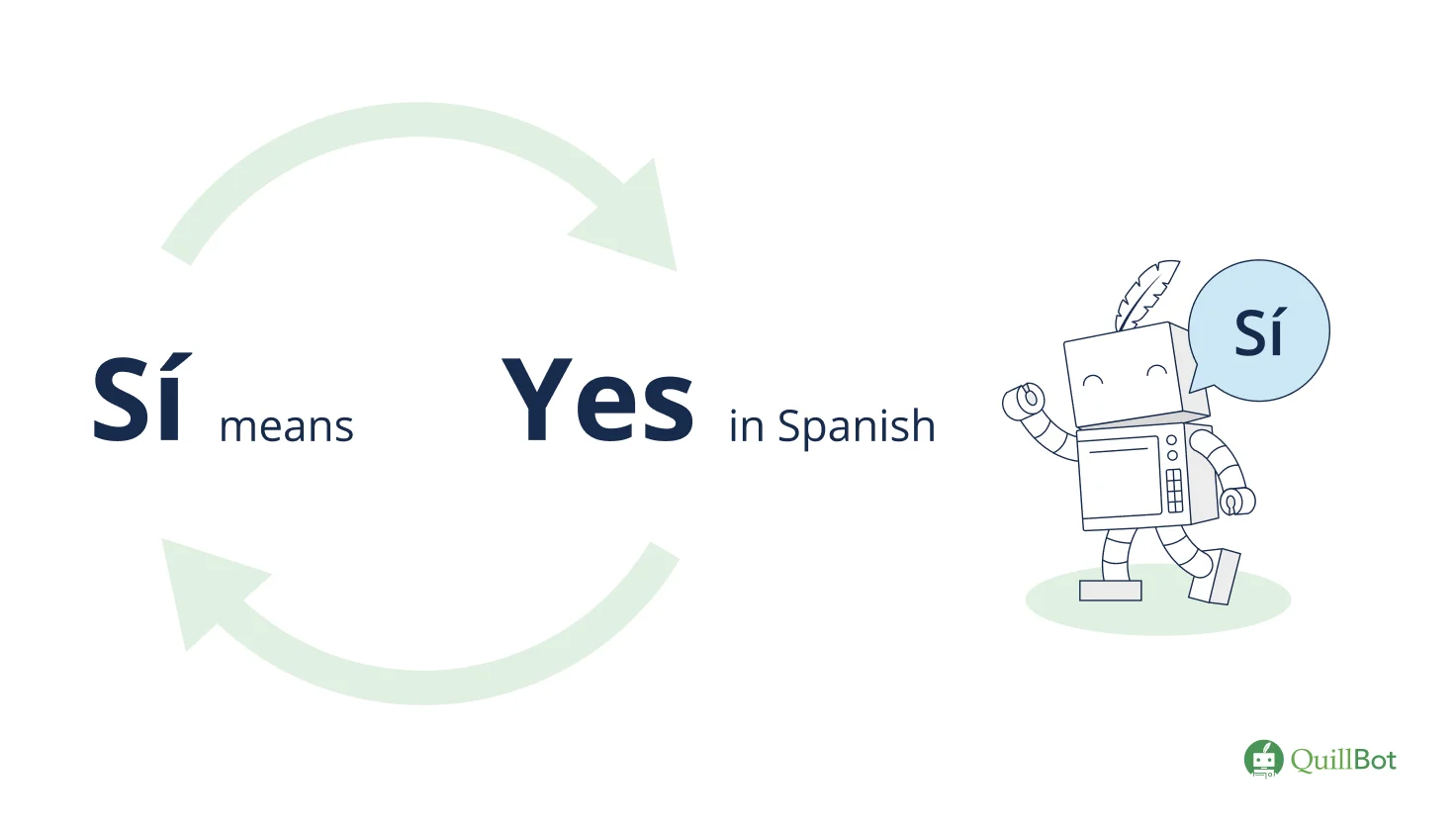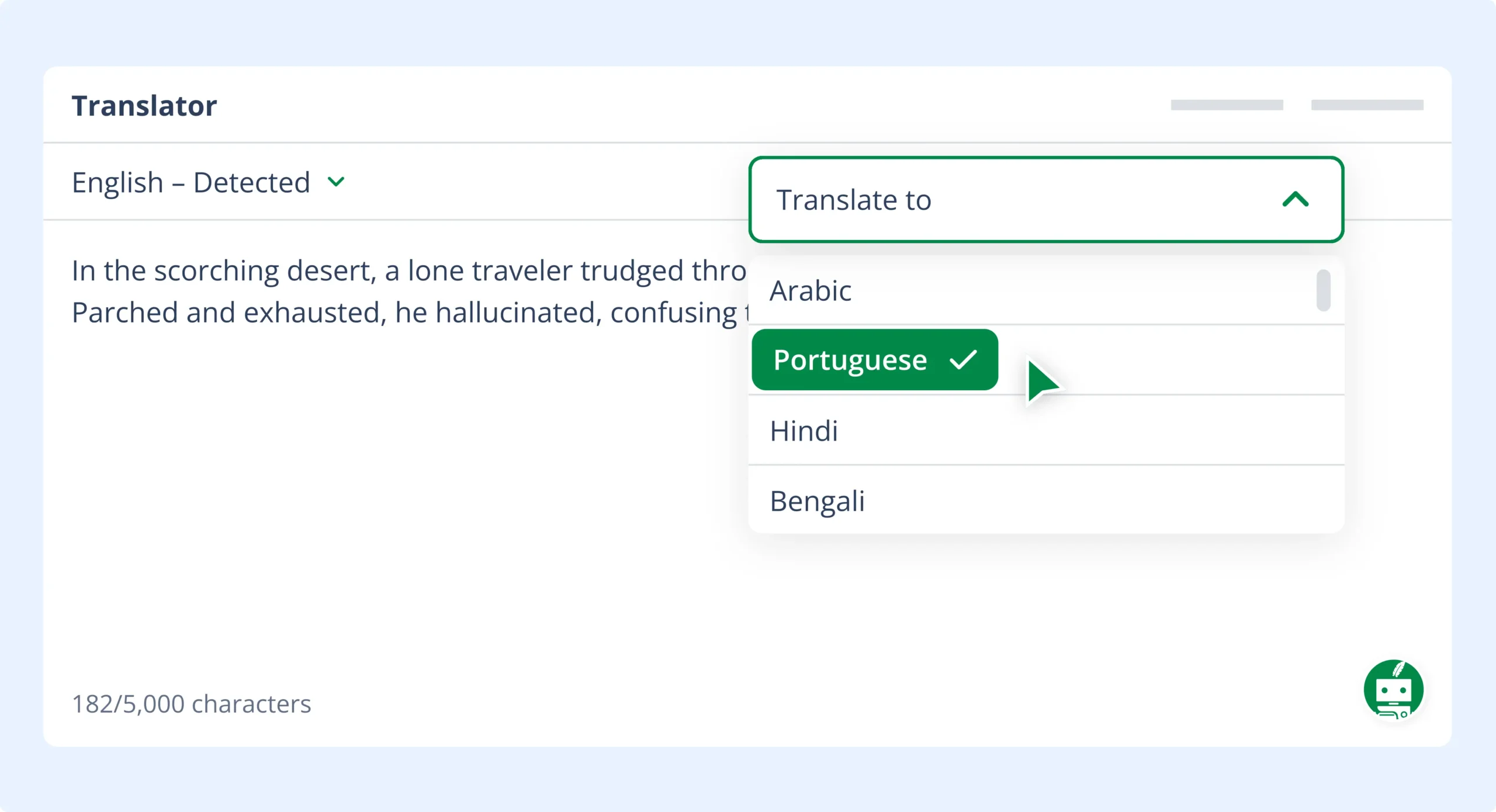How to Say Yes in Spanish | 6 Phrases & Examples
Sí (pronounced “see”) is the most common way to say yes in Spanish, as it is a direct translation. But similar to English, there are many other ways to say “yes” in Spanish, including claro, por supuesto, bueno, and cómo no.
| Phrase | Examples |
|---|---|
| Sí
(Yes) |
Sí, me gustaría probar el especial del día.
[Yes, I would like to try the daily special.] |
| Claro
(Of course) |
Claro que te puedo ayudar con el proyecto.
[Of course I can help you with the project.] |
| Por supuesto
(Of course) |
Por supuesto que vamos todos juntos.
[Of course we’re all going together.] |
| Bueno
(Alright) |
Bueno, te esperaré aquí.
[Alright, I’ll wait for you here.] |
| Cómo no
(Of course) |
¡Cómo no! Me encantaría acompáñate.
[Of course! I’d love to join you.] |
| De acuerdo
(Agreed) |
De acuerdo. Nos vemos el lunes.
[Agreed. See you on Monday.] |
Sí
“Sí” means “yes” in Spanish. It is a straightforward way to agree to something or express the affirmative. It’s versatile, suitable for formal and informal contexts.
[Would you like to come with me to watch a movie with Dad?]
Person B: ¡Sí, me encantaría!
[Yes! I’d love that.]
Person A: ¿Vas a recoger a María de la escuela hoy?
[Are you picking up Maria from school today?]
Person B: Sí, la recogeré a las tres de la tarde.
[Yes, I will pick her up at three in the afternoon.]
“Sí” (with the accent) means “yes.” “Si” (without the accent) means “if.”
- Sí, voy a llegar a tiempo.
[Yes, I’ll be there on time.] - Llegaré a tiempo si el autobús sigue el horario.
[I’ll arrive on time if the bus remains on schedule.]
Claro
“Claro” (pronounced “klah-ro”) is another way to say “yes” in Spanish, though it’s more closely translated to “of course.” And like “of course,” “claro” is an emphatic way of saying “yes.”
[Can you help me, please?]
Person B: ¡Claro! Sin problema.
[Of course! No problem.]
Person A: ¿Quieres ir a cenar?
[Do you want to go to dinner?]
Person B: ¡Claro! Tengo mucha hambre.
[Of course! I’m very hungry.]
Please note that “claro” can also mean “clear” (e.g., “Todo esta bien claro.”)
Por supuesto
“Por supuesto” (pronounced “por-sue-pueh-stoh”) can be translated to “of course” or “certainly,” meaning it’s another way to unreservedly say “yes” in Spanish.
[Do you want to win twenty dollars?]
Person B: ¡Por supuesto!
[Of course!]
Person A: ¿Y Caro va contigo?
[And is Caro going with you?]
Person B: Por supuesto. Ella siempre me acompaña.
[Of course. She always accompanies me.]
Bueno
“Bueno” (pronounced “boo-eh-no”) has many uses and definitions in Spanish. Because it can mean “alright” or “okay,” it’s often used as a less emphatic way to say “yes” in Spanish.
[Can I stay a little longer?]
Person B: Bueno, te recojo en una hora.
[Okay, I’ll pick you up in an hour.]
Person A: No quiero ir a la escuela hoy.
[I don’t want to go to school today.]
Person B: Bueno, pero mañana, sí tienes que ir.
[Okay, but tomorrow you do have to go.]
Cómo no
“Cómo no” (pronounced “coh-moh-no”) is another way to say “yes” in Spanish. It’s more accurately translated as “of course” because it conveys an enthusiastic yes. Think of it as meaning, “How can I say no?”
[Do you want to accompany me to my sister’s party?]
Person B: ¡Cómo no! Estoy muy aburrida aquí.
[Of course! I’m very bored here.]
Person A: ¿Quieres un perrito?
[Do you want a puppy?]
Person B: ¡Cómo no! A mí me encantan los perritos.
[Of course! I love puppies.]
De acuerdo
“De acuerdo” translates to “agreed,” and is therefore used as a formal way to say “yes” or express agreement towards something in Spanish.
[I think it would be best to talk about this during our appointment.]
Person B: De acuerdo. Buena idea.
[Agreed. Good idea.]
Person A: Salgo a las siete. ¿Me puedes recoger a las ocho?
[I leave at seven. Can you pick me up at eight?]
Person B: De acuerdo. Nos vemos a las ocho.
[Agreed. See you at eight.]
Frequently asked questions about yes in Spanish
- How do you say yes ma’am in Spanish?
-
“Sí, señora” is how to say “yes ma’am” in Spanish.
Please note that “sí” is a direct translation of “yes” in Spanish, but there are many other phrases that can be used.
- How do you say yes you can in Spanish?
-
“Sí tú puedes” is how to say “yes you can” in Spanish.
Remember that yes in Spanish is spelled “sí” (with an accent).
Cite this QuillBot article
We encourage the use of reliable sources in all types of writing. You can copy and paste the citation or click the "Cite this article" button to automatically add it to our free Citation Generator.
Rancaño, G. (2025, December 02). How to Say Yes in Spanish | 6 Phrases & Examples. Quillbot. Retrieved February 26, 2026, from https://quillbot.com/blog/spanish-language/yes-in-spanish/


